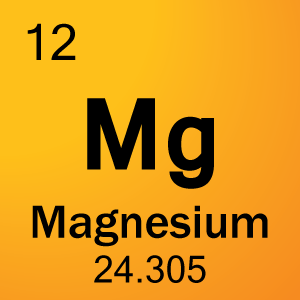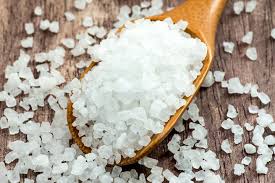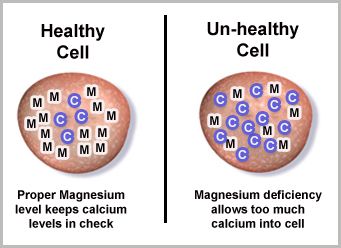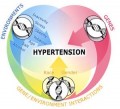Magnesium - The Life Changing Mineral

This article is going to give you information that might change your health and your life for the better. Now, by reading this you might get a little depressed at first (as I did when I started researching the subject - firstly for my own health), because the facts are scary, but all hope is not lost. Push through until the end. I promise there is light at the end of this tunnel - it also could be the very information that safes your or your loved one's life.

Why is Magnesium important to the human body?
Magnesium is the fourth most abundant mineral in the human body. It plays several important roles in the health of your body and brain. About 60% of the magnesium in your body is found in bone, while the rest is in muscles, soft tissues and fluids, including blood. In fact, every cell in your body contains it and needs it to function. But, you may not be getting enough of it, even if you eat a healthy diet.
Magnesium plays a vital role in protecting us from the onslaught of man-made chemicals all around us. This amazing mineral is utilized by the body for all sorts of detoxification pathways and is necessary for the neutralization of toxins, overly acidic conditions that arise in the body, and for protection from heavy metals.
The body uses Magnesium for more than 300 biochemical reactions in the body. Without magnesium we could not produce energy, our muscles would be in a permanent state of contraction and we would not be able to adjust the levels of cholesterol produced and released into the blood stream.
Glutathione is an antioxidant normally produced by the body. It detoxifies mercury, lead and arsenic among others but it needs magnesium for its synthesis.
Low levels of brain magnesium contribute to the deposition of heavy metals in the brain that heralds Parkinson’s and Alzheimer’s. It appears that the metals compete with magnesium for entry into the brain cells. If magnesium is low, metals gain access much more readily.
“There is also competition in the small intestine for absorption of minerals. If there is enough magnesium present, aluminum won’t be absorbed.”
Magnesium is a VITAL regulator of our basic health.

How Magnesium Functions in the Body
How do I know if I need Magnesium?
Magnesium deficiency is not easily diagnosed, which is why so many people operate with low-level chronic deficiencies unaware of the long term effects on their health. Take a look at the list of symptoms below. If you have a couple or more of these symptoms, you might be magnesium deficient.
What are the symptoms of Magnesium deficiency?
1. Calcification of the Arteries - Calcification of arteries from low magnesium levels can lead to coronary problems like heart disease. In fact, half of all heart attack patients receive injections of magnesium chloride to help stop blood clotting and artery calcification.
2. Heart Arrhythmia
3. Irregular heartbeat
4. Muscle Spasms and Cramps - Just as calcification causes stiffening of the arteries, it can cause stiffening of muscle tissue as well, leading to cramps and spasms.
5. Anxiety & Depression - There is a lot of research showing that magnesium deficiency can have a tremendous impact on mental health. Psychology Today explains one possible reason:
Magnesium hangs out in the synapse between two neurons along with calcium and glutamate. If you recall, calcium and glutamate are excitatory, and in excess, toxic. They activate the NMDA receptor. Magnesium can sit on the NMDA receptor without activating it, like a guard at the gate. Therefore, if we are deficient in magnesium, there’s no guard. Calcium and glutamate can activate the receptor like there is no tomorrow. In the long term, this damages the neurons, eventually leading to cell death. In the brain, that is not an easy situation to reverse or remedy.
Serotonin (your happy hormone), which relaxes the nervous system and elevates mood, is also dependent on Magnesium.
6. High Blood Pressure/Hypertension - This is perhaps one of the most-studied areas of magnesium deficiency. A Harvard study of over 70,000 people found that those with the highest magnesium intake had the healthiest blood pressure numbers. A follow up meta-analysis of available studies showed a dose-dependent reduction of blood pressure with magnesium supplementation. A University of Minnesota study showed that the risk for hypertension was 70% lower in women with adequate/high magnesium levels.
7. Hormone Problems - The higher the oestrogen or progesterone levels in a woman’s body, the lower the magnesium. This is also part of the reason why pregnant women experience more leg cramps and women notice more of these muscular type complaints and PMS in the second half of their cycles when progesterone/oestrogen are higher and magnesium is depleted. Dark Chocolate is a decent source of magnesium, and there is speculation that cravings for chocolate may be a sign of magnesium deficiency. Muscle cramps related to the menstrual cycle can also be related to magnesium levels.
Dr. Carolyn Dean, author of the Magnesium Miracle, often recommends that women with bad PMS and cramps take magnesium early in their cycles before the symptoms begin. Hair loss might also be an indication that magnesium deficiency is affecting your hormones.
8. Pregnancy - Related to the hormone problems above, magnesium levels can drastically affect pregnancy health and mood. Morning sickness can be decreased significantly by supplementing with transdermal magnesium (magnesium oil applied to skin). Magnesium is also often used to help with pregnancy related hypertension and muscle cramps, to help ward off preterm labour and to alleviate headaches. Preeclampsia is a complication some women experience in pregnancy. If left untreated, preeclampsia can be life-threatening to both the mother and her baby. Magnesium sulphate (given intravenously) is the treatment of choice for severe preeclampsia. It helps to prevent eclampsia – or after eclampsia develops, to prevent recurrence.
9. Infertility - While remaining replete in magnesium is beneficial to fertility, addressing magnesium deficiency prior to conception can also be crucial to maintaining a healthy pregnancy.
Even more importantly, however, is the role magnesium plays in your baby’s overall health. Being deficient in magnesium has been tied to an increased risk of miscarriages, as well as sudden infant death syndrome, foetal growth retardation, gestational hypertension, preeclampsia and premature labour. This is a nutrient which will prove to be essential far beyond the trying to conceive stage you may now be in, with lasting implications to both your fertility and the eventual development of a healthy foetus.
10. Sleep Problems - With all of the above symptoms of deficiency, it makes sense that magnesium would have a drastic impact on sleep, but the impact is often immediately noticeable when a person starts taking magnesium. Magnesium has been called the ultimate relaxation mineral. Magnesium helps relax the body and the mind, which both contribute to restful sleep. Additionally, magnesium is needed for proper function of the GABA receptors in the brain, and GABA is the neurotransmitter that allows the brain to transition to a restful state.
11. Low Energy / Muscle Weakness - Magnesium allows the body to produce more Insulin-like Growth Factor (IGF-1), which is a major contributor to the growth and strength of muscles. Furthermore, adenosine triphosphate (ATP) is the cell's energy store, and is created with help from Magnesium. In other words, without magnesium, you literally won’t have energy on a cellular level. This shows up as fatigue (or chronic fatigue, low-energy, lack of drive and other problems.
12. Bone Health - Magnesium is needed to stimulate the hormone calcitonin which draws calcium out of the muscles and soft tissues and into the bones. This helps explain why magnesium helps lower the risk of heart attack, osteoporosis, arthritis and kidney stones.
13. Nausea and Vomiting
14. Stomach Cramping
15. Asthma - Cystitis (Bladder Infection)
16. Diabetes - Magnesium enhances insulin secretion, which facilitates sugar metabolism. Without Magnesium, glucose is not able to transfer into cells. Glucose and insulin build up in the blood, causing various types of tissue damage, including the nerves in the eyes.
17. Hypertension (High Blood Pressure)
18. Hypoglycemia (Low Blood Sugar)
19. Musculoskeletal conditions (fibromyalgia, cramps, chronic back pain, etc.)
20. Neurological disorders - E.g. Seizures, Migraine, Vertigo, Behavioural Problems
22. Trouble Swallowing
23. Tooth decay - Magnesium deficiency causes an unhealthy balance of phosphorous and calcium in saliva, which damages teeth.
The list looks frightening and I’m sure that there could be more symptoms that’s not mentioned here – but don’t stress – in the majority of cases, any and all of these symptoms can be reversed with proper magnesium therapy which you can administer yourself or through a professional.

So what causes Magnesium deficiency?
Depleted Soil - Magnesium is among the myriad of minerals lost to industrial agriculture practices. If the nutrients aren’t in the soil, they aren’t in our food.
Municipal Water Supplies - Our ancestors evolved in a world in which mineral rich drinking water came directly from streams, rivers, and lakes. Over time the human body became reliant on obtaining a considerable portion of its daily mineral needs from natural water sources.
Fast-forward to the twenty-first century. We now obtain drinking water from taps or plastic bottles because Pesticides and other chemicals seeping into the water supply have made everyone suspicious of water quality. As a result, municipal water-purification facilities have intensified their efforts to remove contaminants like lead, pesticide residues, and nitrates from drinking water. This over treatment of the water, in turn, has depleted drinking water of all its minerals like calcium and magnesium.
Poor Nutrient Absorption in the Gut - If you’re gluten-intolerant or know you have other digestive issues like leaky gut, then chances are you’re simply not absorbing enough magnesium from your food and are enduring a magnesium deficiency.
Some common causes of leaky gut include: too many rounds of antibiotics, antacids, prescription/over-the-counter meds, antidepressants, too much alcohol consumption, drinking fluoridated water, and even stress.
Too much Calcium - We need calcium to absorb magnesium. Yet’ it’s a delicate balance because the two minerals compete for resources within our body. If you eat too much calcium, you actually hinder your absorption of magnesium.
Studies indicate that taking a calcium supplement without enough magnesium can increase the shortage of both nutrients. Researchers have found that many Americans have five times as much calcium as magnesium in their bodies, although the proper ratio for optimum absorption of both minerals is two to one.
Poor Diet - Common substances that many of us consume daily, like caffeine and sugar, also deplete the body’s magnesium levels.
Stress - Stress is your body's way of responding to any kind of perceived demand or threat. When you feel threatened, your nervous system responds by releasing a flood of stress hormones, including adrenaline and cortisol, which prepares the body for fight or flight. Under normal circumstances, once the stress has ceased, magnesium helps to push the calcium back outside the cell, allowing the cell to calm down. Adrenaline drops off, nerves calm down and muscles start to relax again. With plenty of magnesium, you can undergo stress and come out of it on the other side without batting so much as an eyelash. Without magnesium — and without magnesium properly balancing calcium consistently in your bloodstream —, You undergo stress and recover a little bit but never completely. Then you undergo stress again and again and again, each time having less and less magnesium at your service to help you cope through the episode. Stress starts to break your body down and leaves it weak and defenceless against a bunch of ugly ailments and diseases.

What are the benefits?
Transdermal Magnesium Therapy is a healing modality in which magnesium oil is applied to the skin to be absorbed. The skin is the largest organ of the body so by applying the oil topically, you absorb large amounts of magnesium without stomach upsets. Studies have shown that taking the magnesium orally, does not afford proper absorption through the intestines, which over time, may leave the body deficient of magnesium – setting you up for all sorts of ailments later.
It’s not uncommon that someone taking magnesium for one particular purpose notices its powerful beneficial effect in other areas. People suddenly find they are less irritable, have fewer aches and pains, they sleep better or their energy levels have shot up. This is the power of giving your body what has been dubbed the “master mineral.” Some of the conditions which could benefit from magnesium therapy include:
- ADHD
- Chronic fatigue syndrome
- Depression
- Epilepsy
- Diabetes mellitus
- Tremors
- Parkinson’s disease
- Arrhythmias
- Migraines
- Circulatory disturbances:
- Stroke
- Cardiac Infarction
- Arteriosclerosis
- Cluster headaches
- Cramps
- Abdominal pain
- Osteoporosis
- Asthma
- Stress-dependent disorders
- Tinnitus
- Ataxia
- Confusion
- Preeclampsia
- Weakness
- Hypertension
Magnesium products that works well with Transdermal Therapy
First of all, make sure that the magnesium products you buy comes from the purest sources possible. You don’t want to load up on more toxins when you use a lesser quality product.
The best type of products to use for Transdermal Magnesium Therapy are:
Magnesium Oil – can be sprayed on the skin or under the tongue (be aware that it tastes very bad!). Spray on arms / legs / tummy and leave on for approximately 20 minutes. Slight tingling may occur. This happens when there is a magnesium deficiency in the body. The tingling will diminish with longer use. You can wipe off the excess but no harm is caused by leaving it on. Avoid very sensitive areas on the body, cuts and your eyes as it can sting quite a bit.
Magnesium Gel - can be rubbed on the skin. Again, avoid highly sensitive areas of the skin. This also should be left on for 20 minutes or more.
Magnesium Lotion - This is gentler than either Magnesium Oil or the Magnesium Gel, and is less likely to cause irritation. The magnesium lotion is especially recommended for young children. (In some cases children who have side-effects from vaccines may benefit from transdermal Magnesium Therapy in the form of Magnesium Lotion.)
Magnesium Bath Flakes - can be used for a foot bath or for a whole body bath. Put 1-3 cups in the cleanest purest warm water you can get and use to bath in or as a foot soak. Soak for approximately 20 minutes. This is a great detox, magnesium booster and calming therapy for improving sleep.

Epsom Salt Baths
Another way to boost your magnesium levels (if you don't have direct access to Magnesium oil), is by taking regular Epsom salts baths. Epsom salt is actually a magnesium sulfate and researchers have found that bathing in Epsom salts allows the body to absorb magnesium naturally. The added benefit is that Epsom salts baths are very calming and can also help the body to detox while providing aid to both the joints and digestive system. If you have been suffering from symptoms of what you think might be magnesium deficiency, try taking a warm bath in Epsom salts every night for the next week and see if you aren’t able to notice a difference in the way you are feeling.
There also seem to be good, relevant reasons for using Epsom salts for plants. Epsom salt helps improve flower blooming and enhances a plant's green color. It can even help plants grow bushier. Epsom salt is made up of hydrated magnesium sulfate (magnesium and sulfur), which is important to healthy plant growth.
As you see, there is light at the end of the tunnel and the sooner you start to use topical magnesium products on you, your loved ones, the better.










